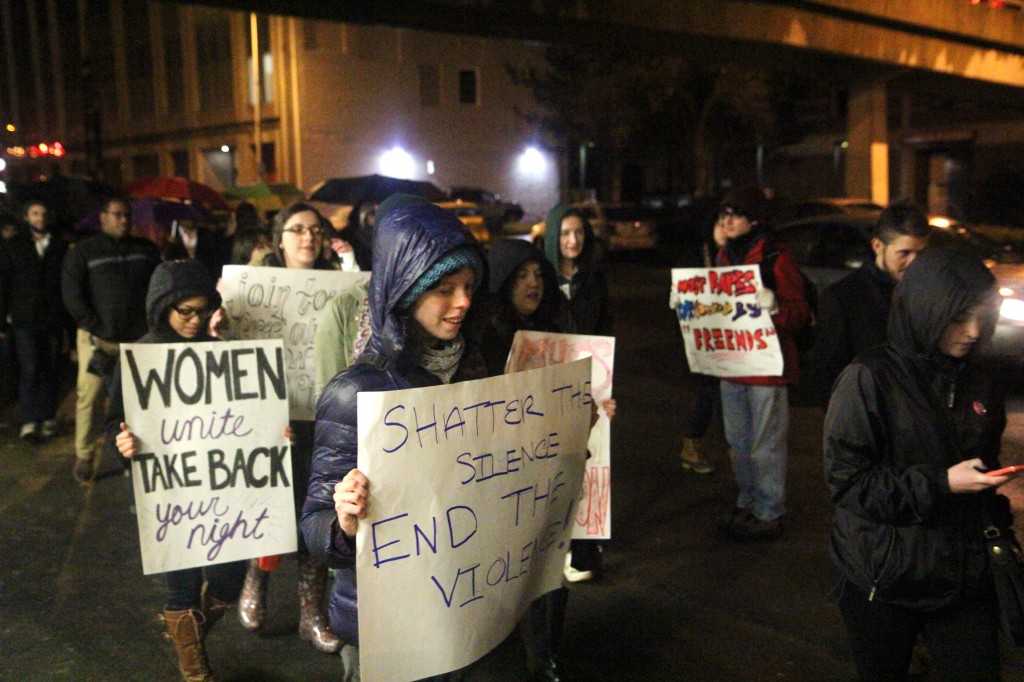
Student groups rallied off campus Friday night to protest the prevalence of sexual misconduct and to advocate for victims of sexual assault.
The idea behind “Take Back the Night,” organized at Binghamton University by the Women’s Student Union (WSU), is that the night represents the fears and myths that surround rape and sexual assault.
Sophie Gamer, the treasurer for the WSU, addressed the crowd gathered at the Peacemaker’s Stage on Court Street Friday night, noting that victims are often judged for the decisions they made, instead of focusing the conversation on the attacker.
“We should not be asking how much she was drinking or what she was wearing, but what made him believe that consent was negotiable,” said Gamer, a sophomore majoring in biology. “We are not going to wait until our peace of mind is given to us, we are going to take it back on our own power tonight.”
Amy Petrick, the founder of Healing House, a local nonprofit aimed at helping adult survivors of abuse, spoke about her own experience struggling with how to tell her family about her abuse, which started at the age of five.
“I was embarrassed, I was ashamed and I was guilty,” Petrick said. “I was not going to tell anybody about what I had done, because I felt that it was all my fault.”
Bonnie Hanna, a University Police Department (UPD) officer, agreed that many factors frequently prevent victims from coming forward, reporting crimes and getting the help they need.
She said victims often feel embarrassed and guilty, and are afraid of getting into trouble either with the University or their parents.
Hanna said she always tries to dispel any rumors that victims could get into trouble, noting that by law, UPD cannot notify any parent of a report a student makes. She said she views any student that comes to her as family, and that the process of pressing charges can be traumatic for young victims and is by no means the only course of action.
“What we want you to understand … is that by coming to the police, [it] does not mean you have to press charges,” Hanna said. “If you’ve been victimized, you’ve had one of the most personal, intimate decisions taken from you. My goal and the goal of my department is to give you as many of those choices back to you.”
The rally was followed by a “Survivor’s Speak-Out” at Uncorked Creations, an art gallery on State Street. Men and women who had experienced rape, sexual assault, abuse and other forms of violence opened up about their experiences.
Mariella Millien, who attended the rally, said she felt that there were barriers to effective communication about sexual violence.
“Women and all kinds of people who are victimized, who are exploited, don’t feel comfortable talking about it because culturally here in America we are not allowed to talk about it,” said Millien, a senior majoring in anthropology. “This gives us space to talk about it and to unite and be one and stand for our rights as women and as human beings.”
Interns from the Interpersonal Violence Prevention program and the 20:1 Sexual Assault Prevention Program spoke at various points in the night as the rally made its way from Court Street to State Street.
Maryam Haque, the secretary of Voices Against Violence, a club that focuses on raising awareness about relationship violence, spoke about her personal reasons for supporting and attending events like “Take Back the Night.”
“We’ve all heard the statistics. Your attacker is more likely to be someone you know than a stranger in an alley,” said Haque, an undeclared sophomore. “I didn’t have events like this before I got to college, and I was assaulted in a committed, seemingly healthy relationship.”
Denis Loredan, a 20:1 peer educator who presents to different groups on campus about how to prevent sexual assault, said he was affected by a 20:1 presentation his freshman year of a video of survivors talking about the consequences and effects of their sexual assaults. He said that sexual assault can be prevented when people are given the right education.
“We tell people that its not the absence of a ‘no’ but the presence of a ‘yes,’” said Loredan, a senior majoring in biology. “We try and teach men that by always asking for consent, we can prevent sexual assault.”
Lauren Schauer, the former president of WSU and an openly bisexual woman, said discussion of preventing rape and sexual assault cannot ignore how these crimes affect the LGBTQ community and communities of color. She said the misogyny that reduces women to objects of sexual violence is the same misogyny that underscores homophobia, transphobia and other forms of prejudice.
“We cannot separate ourselves by our differences or refuse to see the connection between forms of oppression and sexual violence,” said Schauer, a senior majoring in history. “Our fight is one fight. Rape is not solely a woman’s issue, it is not solely a heterosexual woman’s issue. Rape is a human issue.”
Deidre Mensah, the president of WSU and a senior majoring in environmental science, said the purpose of the rally was not only to educate, but to begin making the world a safer place.
“I am taking back the night so my three younger sisters won’t have to,” she said. “I am taking back the night so that I, and many other women, won’t have to feel unsafe at night by virtue of existing as a woman.”


